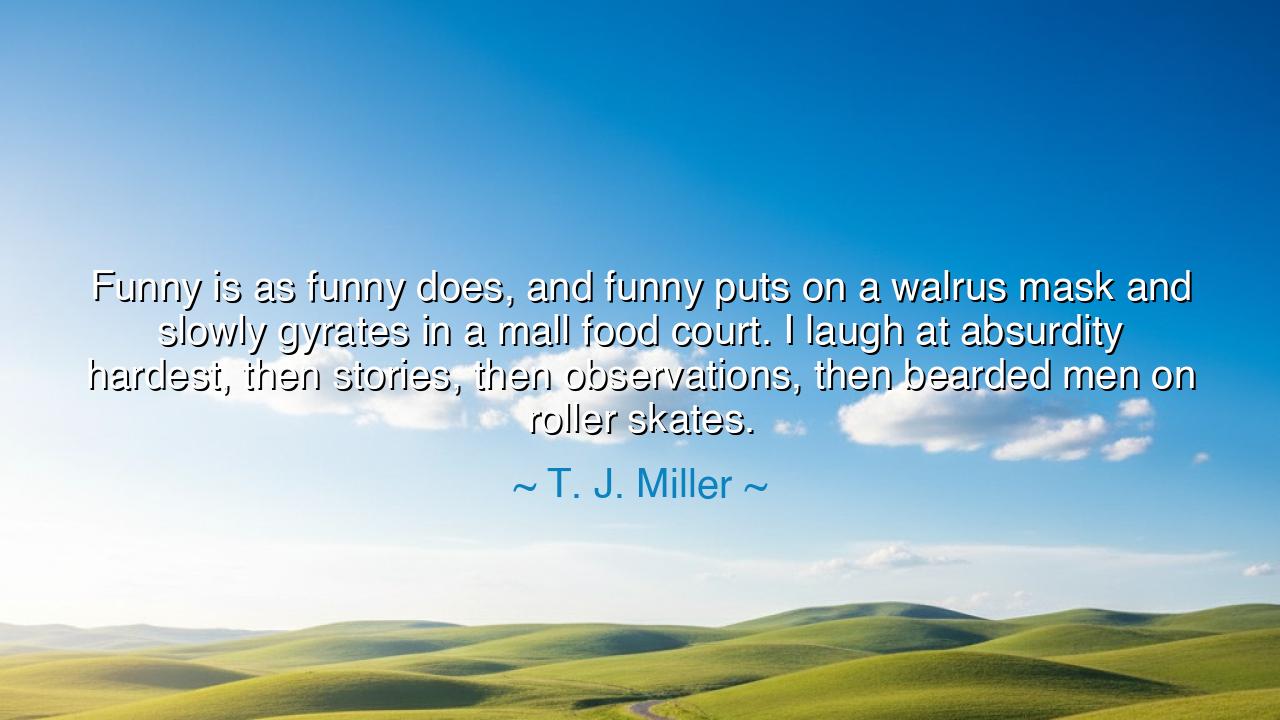
Funny is as funny does, and funny puts on a walrus mask and
Funny is as funny does, and funny puts on a walrus mask and slowly gyrates in a mall food court. I laugh at absurdity hardest, then stories, then observations, then bearded men on roller skates.






In the strange and shimmering words of T. J. Miller, there lies a wisdom that dances beneath the veil of laughter. “Funny is as funny does,” he declares, as though speaking not only of jesters and comedians but of the human spirit itself. For laughter, like truth, cannot be manufactured; it must arise from the raw materials of existence — the unexpected, the absurd, the painfully honest. When he speaks of a walrus mask gyrating in a mall food court, he speaks not merely of nonsense, but of the sacred chaos from which all true humor — and perhaps all creation — is born. He reminds us that absurdity is not foolishness, but a mirror reflecting the divine comedy of life itself.
In the age of the ancients, humor was no trivial pursuit. The wise Diogenes the Cynic, who once lived in a barrel and mocked the kings of his day, understood what Miller now echoes: that laughter is rebellion wrapped in mirth. When Diogenes walked through the city at noon with a lantern, saying he searched for an honest man, he made the people laugh — yet he also made them see. His absurdity was his power. In the same way, the image of a man wearing a walrus mask, moving strangely amid the dull hum of a shopping mall, becomes a sacred act of defiance. It is the poet’s way of saying: Behold, life itself is ridiculous — and that is why it is beautiful.
The ordering of Miller’s laughter — absurdity first, then stories, then observations, and lastly bearded men on roller skates — is not random. It is a hierarchy of the human condition. We laugh hardest at the absurd, because it tears the veil from reality and exposes its trembling core. Next, we laugh at stories, for they bind us together, reminding us that our foolishness is shared. Then come observations, the wit of the mind, sharp but distant. And last, the bearded man on roller skates — the physical, the visible, the spectacle. Thus, the deeper the laughter, the more it touches the soul; the more superficial, the more it amuses only the eye.
Consider the tale of Charlie Chaplin, the silent sage of modern times. In his film The Great Dictator, he turned the monstrous into the absurd — a tyrant made foolish by his own gestures, his own vanity. People laughed, yet through their laughter came recognition: the absurdity of power, the fragility of pride. Chaplin, like Miller, understood that comedy is the philosopher’s torch. It illuminates the dark corners where logic fails and humanity hides. It burns away the false dignity of the world until what remains is the trembling, honest laughter of beings who know they are small, and yet divine.
To laugh at absurdity, then, is to embrace the truth that life itself is both terrible and comic. The gods of Olympus laughed; so too did the monks of old, who found humor in their own frailty. For laughter humbles the mighty and uplifts the weary. It binds strangers and dissolves despair. The man who cannot laugh at the world’s madness becomes brittle and cruel, while the one who can — the one who sees a walrus mask in a food court and finds beauty in its foolishness — that man remains free.
Yet beware, O listener, for laughter without understanding becomes mockery, and mockery without compassion becomes cruelty. The true comedian, like the true philosopher, laughs not at others but with them — at the vast, cosmic absurdity in which all men and women find themselves entangled. He who learns to laugh thus learns also to forgive. The fool who dances in the mall may seem mad, but in his madness lies an echo of truth: that all order needs a touch of chaos to remain alive.
Therefore, let this be your lesson: seek out the absurd, honor it, and let it humble you. When the world demands that you walk straight, allow yourself, now and then, to gyrate in joyful defiance. Laugh not to escape reality, but to face it bravely. When grief weighs upon your heart, find a fragment of the ridiculous and let it lift you — for laughter is not denial but resurrection. And when you see others struggling, bring them not solemn words, but the gift of shared amusement.
In this way, you will become as Miller teaches: one who sees the sacred in the silly, the profound in the preposterous. For life, after all, is a theater of the absurd — and to laugh at it wisely is to understand it deeply. So let the world wear its masks, and let us, too, wear ours — but with a smile that knows the truth: funny is as funny does, and laughter, when born from the heart, is the highest form of wisdom.






AAdministratorAdministrator
Welcome, honored guests. Please leave a comment, we will respond soon